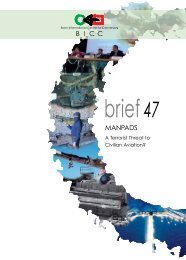egypt-final-presidential-elections-2012
egypt-final-presidential-elections-2012
egypt-final-presidential-elections-2012
Create successful ePaper yourself
Turn your PDF publications into a flip-book with our unique Google optimized e-Paper software.
The Carter Center<br />
Presidential Election in Egypt<br />
Egypt that mandate freedom of association, by perpetuating<br />
opaque criteria and arbitrary bureaucratic<br />
procedures that undermine the transparent and timely<br />
registration of CSOs. 139 While the Emergency Law or<br />
other laws with similar provisions restricting political<br />
rights have been in effect, the present legal framework<br />
has been further prone to abuse, infringing on the<br />
right to freedom of expression, due to the threat of<br />
criminal charges against individuals and organizations<br />
advocating for human rights, political liberalization,<br />
and social reform.<br />
Although a coalition of political groups and civil<br />
society organizations has pushed for reform of the<br />
restrictive legal framework governing CSOs, no<br />
meaningful amendments of the legal framework<br />
governing CSOs were implemented during the<br />
<strong>presidential</strong> electoral process. This absence of reform<br />
impedes the realization of CSOs’ role as valuable<br />
independent stakeholders in the election process.<br />
To better meet its international obligations, The<br />
Carter Center urges Egypt’s future legislators to adopt<br />
new laws that safeguard the freedom of CSOs and<br />
their work from state interference while ensuring<br />
transparency and accountability. This would ensure<br />
Egypt lives up to its obligations to guarantee the<br />
right to participate in public affairs and to promote<br />
transparency. 140<br />
The Role of CSOs in Witnessing the<br />
Presidential Election<br />
Both domestic and international CSOs participated<br />
in the election process, primarily as election<br />
witnesses. Although not required by law, the PEC<br />
made provisions for both national and international<br />
CSOs to witness the process, but only after key electoral<br />
processes including voter registration and candidate<br />
nomination had already concluded. On April 23,<br />
<strong>2012</strong>, the PEC issued Decision Nos. 11 and 12, which<br />
authorize and regulate the process for domestic and<br />
international CSOs, respectively, to witness the election<br />
process.<br />
While the deadline for submitting applications<br />
to witness was May 2, <strong>2012</strong>, the PEC only issued<br />
the badges that individual witnesses must possess to<br />
do their work in the week prior to the first round of<br />
polling. CSOs were only able to witness the polling<br />
days as well as the interim campaign period between<br />
the first and second phase of polling. As a result, the<br />
value of their overall observations of the electoral<br />
process was diminished.<br />
In addition to the timing of the PEC decisions<br />
regulating election witnessing, both domestic and<br />
international CSOs were disappointed by the<br />
reporting restrictions and time limitations for CSO<br />
witnesses. 141 PEC regulations prohibited domestic and<br />
international CSOs from commenting on the process<br />
prior to the announcement of the election results by<br />
the PEC. 142 This is inconsistent with the Declaration<br />
of Principles for International Election Observation<br />
and the Declaration of Global Principles for<br />
Non-Partisan Election Observation and Monitoring<br />
by Citizen Organizations, which both maintain that<br />
election observation missions should be able to freely<br />
issue public statements and reports regarding their<br />
findings and recommendations about the election<br />
processes and developments without interference.<br />
Limiting witnessing missions to after-the-fact statements<br />
means there is no possibility for them to<br />
positively impact the current election process. 143<br />
The Carter Center recognizes that the release of<br />
official election results can only be done by the EMB.<br />
However, the Center urges election officials in the<br />
139 U.N., International Covenant on Civil and Political Rights, Article<br />
22(1): “No restrictions may be placed on the exercise of th[e] right [to<br />
associate freely] other than those which are prescribed by law and which<br />
are necessary in a democratic society in the interests of national security<br />
of public safety, public order (ordre public), the protection of public<br />
health or morals or the protection of the rights and freedoms of others.”<br />
140 U.N., ICCPR, Article 25(a); U.N., United Nations Convention<br />
Against Corruption, Article 5.1<br />
141 Due in large part to these restrictions, 18 national CSOs issued a<br />
statement rejecting PEC decisions regulating election witnessing and<br />
describing them as abusive.<br />
142 See Article 11 of PEC Decision No. 11 for domestic witnesses and<br />
Article 10 of PEC Decision No. 12 for international witnesses.<br />
143 It is worth noting that after much uncertainty, the PEC unofficially<br />
agreed that witness organizations might issue statements after the closing<br />
of polls.<br />
48



